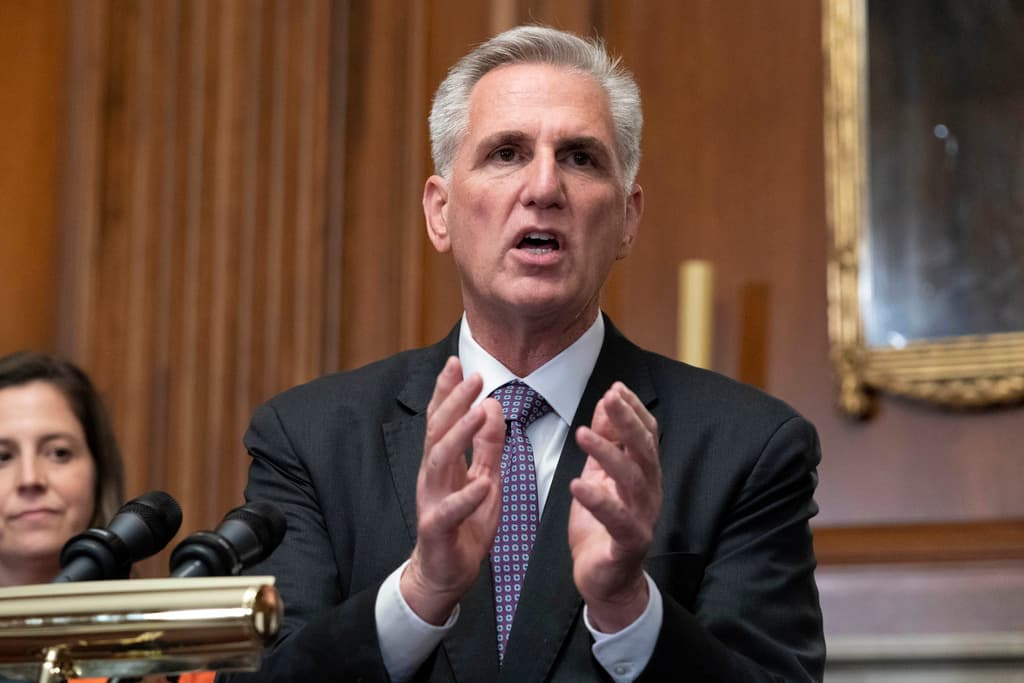Annual National Defense Authorization Act Becomes Latest Front in Culture War
Speaker McCarthy will once again be forced to balance the priorities of House conservatives with the practical realities of must-pass legislation.

As Congress moves to pass the National Defense Authorization Act, more than 1,500 amendments have been filed aimed at pushing conservatives’ culture war priorities via the Pentagon’s $886 billion budget.
The House conservatives’ initiatives include blocking the Department of Defense from covering travel expenses for troops seeking abortions, eliminating all diversity training and initiatives, eliminating funding for gender-affirming care for troops, and stopping any attempt to rename bases named in honor of confederates.
The House Rules Committee on Tuesday is set to decide which of the amendments will be sent to the floor for a vote, which once again forces Speaker McCarthy to balance appeasing conservatives with trying to get the bill passed.
“The Department of Defense’s transformation into a social engineering experiment wrapped in a uniform is the single greatest threat to this nation’s ability to defend itself — and Republicans are complicit,” Congressman Chip Roy told Politico.
As with other big fights over the past seven months, conceding on too many conservative priorities runs the risk of losing the votes of not only Democrats but more moderate Republicans.
On the other hand, a privilege motion to vacate the chair means that any one member of the House could force a vote to remove Mr. McCarthy if his or her amendment isn’t sent to the floor.
Although a litany of amendments is nothing new for the annual authorization act — last year, there were amendments pertaining to such issues as sentencing guidelines for crack cocaine possession and the right to use cash for large retail purchases — Mr. McCarthy’s concessions during the speaker election leave him in a weaker position than previous speakers.
Aside from the culture war amendments added by conservatives, this year’s authorization is set to include a 5.2 percent pay increase for service members and more funding for housing and “quality of life” improvements.
The bill also includes $300 million in new funding for Ukraine. In terms of aid to that country, a Democrat of California, Congresswoman Sarah Jacobs, and a conservative of Florida, Congressman Matt Gaetz, have joined together to try to stop cluster bombs from being sent there via an amendment to the act.
“Children will be left without limbs and without parents because of this decision if we do not work together in a bipartisan fashion to stop it,” Mr. Gaetz said of the Biden Administration move to send cluster munitions to Ukraine.
The House majority leader, Steve Scalise, is also looking to attach the Coast Guard reconfirmation to the NDAA reauthorization, though it’s not yet clear whether Mr. McCarthy supports doing so.
The legislation is scheduled to be voted on by the end of the week, though that could be subject to change depending on how the fight over amendments evolves.
Whatever amendments end up passing in the House will also face the Senate, which is unlikely to support the many culture war amendments proposed by House conservatives.
In a statement released over the weekend, Majority Leader Schumer identified the NDAA as a “prime example of the bipartisan cooperation we strive to achieve” and signaled a willingness to move forward with a competing version of the bill in the Senate.
Eventually, the House and the Senate will need to reconcile the differences between their two versions of the NDAA, a process that has nixed tangential amendments in the past.

